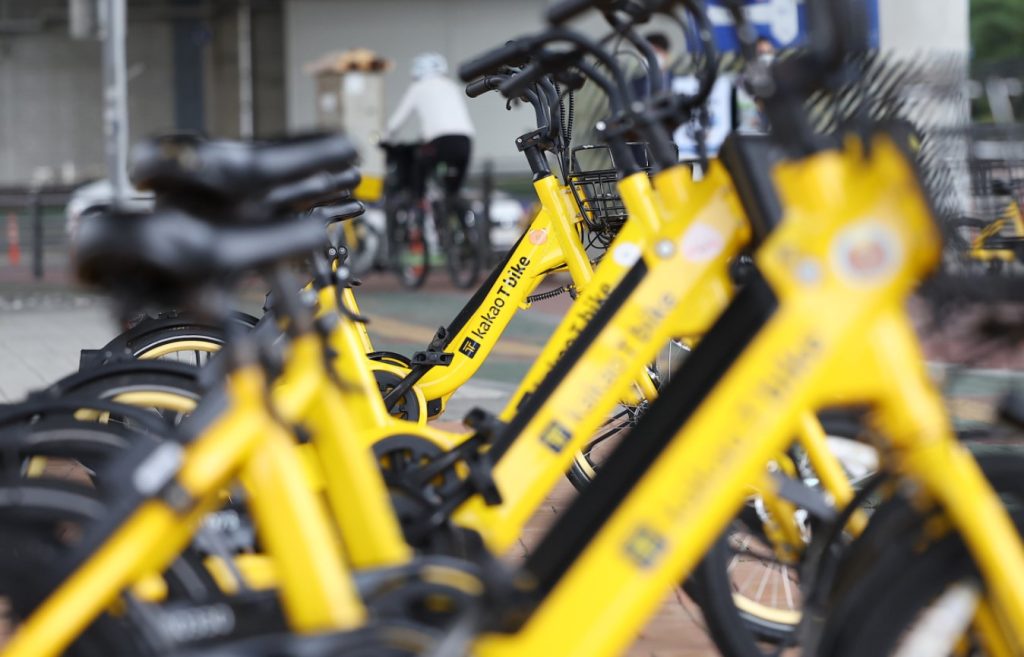
A day has passed since Kakao Corp., the operator of the immensely popular messenger app KakaoTalk, suffered its worst server outage due to a fire at its data center, but there was no complete recovery in sight as of midday Sunday.
“The Pangyo data center is our main data facility that operates around 32,000 servers, but only one third of them – 12,000 servers – have been restored,” Yang Hyun-seo, a Kakao vice president, said during a press conference held in the afternoon.
“It usually takes less than 20 minutes to restore all of the servers, but the extent of server losses is just so massive,” he added, declining to say how long it would take for KakaoTalk and other affiliated services to return to normal.
As of 5 p.m., KakaoTalk users could exchange text messages only, not photos and videos.
It is KakaoTalk’s third service malfunction this year alone and the longest-ever system failure since its launch back in 2002, lasting for almost 10 hours.
KakaoTalk enjoys a near monopoly here, with 45.6 million people out of the total 52 million population using the app to chat and access other popular services, from shopping to ride-hailing.
Naver, the nation’s other top internet company, also used servers at the fire-hit SK C&C building in Pangyo, just south of Seoul, but its backup plan led to a different outcome.
Unlike Naver, which could reduce damage by mobilizing its own data center, Kakao was heavily dependent on the SK facilities, lacking backup servers and contingency plans.
“If Kakao had directly operated its own data centers, it would have continued operations even under disastrous circumstances and have quickly recovered from them,” said Kim Myung-ju, an information security professor at Seoul Women’s University.
“Both SK C&C and Kakao are accountable for the server outage. SK C&C, as the actual data center operator, and Kakao, a party who did not have a thorough contingency plan, despite its 12 years of digital service.”
Kim Seung-ju, an information security professor at Korea University, also echoed the view, saying “Kakao failed to come up with its own backup plans as it had sought to reduce costs of building its own data center.”
Unlike KakaoTalk and other affiliated services, Kakao Bank — which has its own data center — said it had a partial disruption for about two hours, but its server was immediately restored. Naver also said some of its services were temporarily down, but most of them were fixed after a few hours on Saturday.
On Sunday, the government also hinted that it could launch a thorough investigation into KakaoTalk’s worst-ever malfunction.
“I feel very strongly about the inconvenience to users and the damages caused to them by Kakao and Naver’s system failures. I urge the authorities to help Kakao and others speed up the restoration process,” President Yoon Suk-yeol said in a statement released later in the day.
Science and ICT Minister Lee Jong-ho also urged Kakao and Naver to “go back to the basics” and take responsibility to provide stable services. Lee also added that the government will actively consider adopting institutional and technical measures to further monitor major value-added telecommunications facilities. Value-added telecommunications refer to all services beyond voice calls and fax.
Sources say the government and tech industry should speed up the passage of a bill that includes data centers in disaster management. Proposed in 2020, the bill holds data center operators responsible for protecting key data to prevent disasters.
The bill came two years after a fire broke out in the basement of local mobile carrier KT’s communications facility in Ahyeon, western Seoul, in 2018. However, it was thrown out by the National Assembly’s legislation and judiciary committee.
In terms of compensation, Kakao said restoring its server is the priority, after which it will look into reimbursements after estimating the damage.
Since KakaoTalk is a free messaging app, the company is not legally obligated to offer users financial compensation for damages incurred from failing to send or receive messages, sources said.
But in the case of apps that charge subscription fees, Kakao is highly likely to roll out reimbursement measures for subscribed users. Melon, Kakao’s music streaming service operator, announced Sunday through its app that it will provide three days of free subscription service or give out 1,500 won ($1) in cash points to subscribers.